It is 1983 in a northern Italian villa. A young 17-year-old named Elio lives with his parents. His father, a professor, takes in a 24-year-old American grad student named Oliver for the summer. What starts as a friendship filled with passive aggressive banter and nuanced curiosity between Elio and Oliver becomes something more over the course of the summer. This is the story of “Call Me By Your Name,” a beautifully sumptuous film directed by Luca Guadagnino that is based on the novel by Andre Aciman.
Unlike many other romantic films,”Call Me By Your Name” is more observant than it is sentimental. Viewers see these characters for who they are and are not led to tears because of common cliches. Instead, they can expect to feel the full impact of the emotions displayed by Armie Hammer and Timothee Chalamet.
Both of these actors play their roles to amazing lengths, but Chalamet in particular brings a lot of depth to the character of Elio.

Timothee Chalamet (left) as Elio and Armie Hammer (right) as Oliver star in “Call Me By Your Name.”
Picture courtesy of Sony Pictures Classics
From scene to scene, viewers may not necessarily know what Elio is thinking, but they can see it all through his eyes, body language and actions. He inhabits this character with all the ferocity of a veteran actor despite only being 22. His longing gaze takes control of scenes, and we are guided through them.
Out of all the characters in this movie, Elio’s range of emotions run the gamut. He is 17, discovering first love and coming of age in a quiet pensive villa. Half of the time he is unsure of what he wants and is hesitant to speak on his desires at all. His emotional arc is complex, and Chalamet brings great subtlety to the part. Viewers witness his curiosity, fear, courage, experimentation and first experiences all through his eyes. His emotions regress and come back, but there is an evolution and an eventual conclusion that validates Elio’s journey.
The cinematography of the film is nothing short of magic. Lyrical shots of the Italian countryside and the simplicity of acts like swimming in a lake or picking fruit off of trees are rendered like paintings. Individual frames of this film could be hung up as pristine photography.
Many shots at night have a blue dimly lit backdrop of the night sky with characters in black silhouettes interacting. The camera captures all of this in a way that is not invasive but more contemplative. There is no dramatic music blaring or emotional close-ups, although there is nothing wrong with that. Instead, people are meant to feel like flies, seeing love blossom slowly but surely.
The costuming is great, as it fits the 80s European setting really well in this film. Often times, films that get recognized for costuming tend to be older period pieces, but it is worth noting great wardrobe in a film that takes place as recently as 1983.
The film’s score is also a key element in setting the tone of the film. While lacking a traditional score, the songs featured in “Call Me By Your Name” by Sufjan Stevens elevate and heighten many key emotional scenes.
Another highlight of the film was Michael Stuhlbarg as Elio’s father, Mr. Perlman. His understated performance has great impact and culminates in a beautiful monologue that’s one of the highlights of the film.

Mr. Perlman (Michael Stuhlbarg) introduces Elio (Timothee Chalamet) and Oliver (Armie Hammer) in “Call Me By Your Name.”
Photo courtesy of Sony Pictures Classics
The script, written by James Ivory, is also a great anchor of the film. A lot of the motivations are written to be visual rather than through dialogue. The dialogue that exists is succinct and specific so when there finally is a monologue, it is grand.
There are multiple languages and cultures depicted throughout the film from Italian to French to American. It is displayed with ease and confidence so the viewer can understand despite the colloquialisms.
This film is a gem and it is definitely worth a watch for all interested in quiet love stories and lyrical filmmaking. All of these elements come together to tell this ephemeral love story that captures a beautiful moment in time for these two characters.



